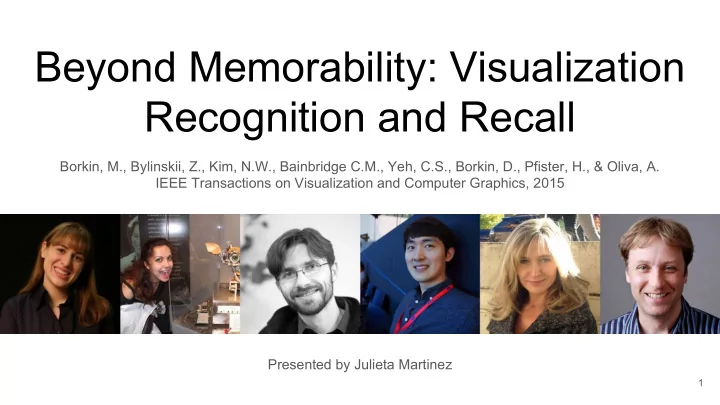

Beyond Memorability: Visualization Recognition and Recall Borkin, M., Bylinskii, Z., Kim, N.W., Bainbridge C.M., Yeh, C.S., Borkin, D., Pfister, H., & Oliva, A. IEEE Transactions on Visualization and Computer Graphics, 2015 Presented by Julieta Martinez 1
What makes an What makes a face What makes a vis image memorable? memorable? memorable? vs. vs. vs. 2
Impact Comprehension Engagement Aesthetics Memory Perception 3
Memory Perception 4
What makes a visualization memorable? 5
Let’s play a game If you see a repeated visualization, clap Seriously, get ready to clap 6
7
8
9
10
11
12
13
14
15
16
17
That’s it. Thanks! 18
memory check likely to be a false positive attention check 19
Data 20
Government Infographic News Science 21
22
“These particular web sites were chosen because each contained a large number of static visualizations that could be automatically scraped without requiring a large manual clean-up effort.” 23
24
25
26
“The annotations were done by ten Harvard University undergraduates who had completed the Harvard introductory visualization course” 27
= bad data-ink ratio? bad bad medium 28
Results 29
A visualization is memorable if… 30
… it has a pictogram (M=1.93 vs. M=1.14) Thus, all results are presented with and without pictograms 31
… it is colorful 32
… it has low data-ink ratio 33
… it is visually dense 34
Some questions remain ● What visual elements do ● Same data people use to ● More labels ○ store into memory? ● Less participants (33) ○ retrieve from memory? ● More time ● Does giving more time ● + Eye tracking make a difference? ● + Word descriptions ● What do people remember? 35
36
37
Step 1: Encode 38
Step 2: Recognize 39
Step 3: recall 40
Does giving more time make a difference? 41
What do people look at? Encoding Recognition Most recognizable Least recognizable 42
Evaluating recall “Percent of people born on ● Quality was rated from 0 to 3 each day of the year. X-axis ○ 0 → incorrect or incoherent is month Y-axis is day. Most popular birthdays are in late ○ 3 → visualization topic, what data or summer and early fall.” information is presented in the visualization, the main message of “this was a chart of most the visualization, and one additional common birthdays. the darker the color the more specific detail about the visualization common the birthday. september was the darkest month” 43
Titles help! So does redundancy! Titles improve recall quality Description quality Description quality 44
Strengths and weaknesses 45
Strengths ● First dataset of its kind ● High quality, transparent research. All the data is available online. ● Props for collecting verbal descriptions of visualizations → machine learning (: 46
Weaknesses ● Data is very skewed ● Who would think tables are memorable? ● Infographics != infovis ● Maybe scientific visualizations are inherently harder to understand 47
Beyond Memorability: Visualization Recognition and Recall Borkin, M., Bylinskii, Z., Kim, N.W., Bainbridge C.M., Yeh, C.S., Borkin, D., Pfister, H., & Oliva, A. IEEE Transactions on Visualization and Computer Graphics, 2015 Presented by Julieta Martinez 48
Recommend
More recommend